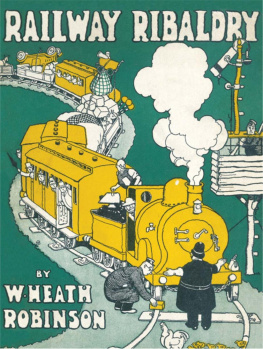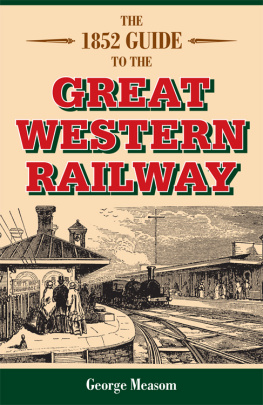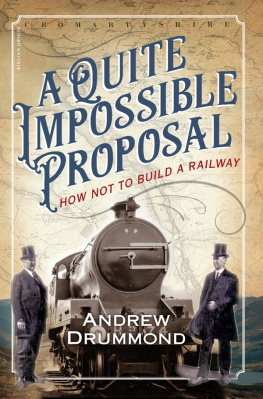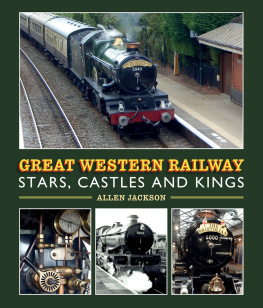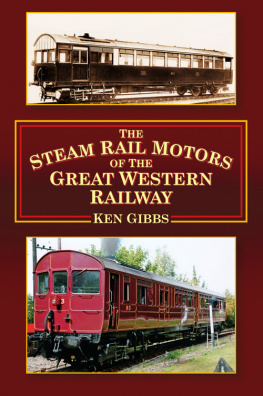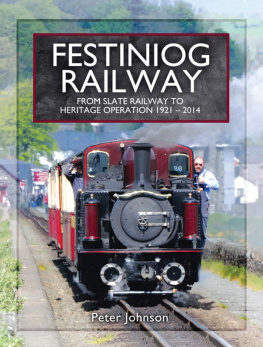Andrew Roden - Great Western Railway
Here you can read online Andrew Roden - Great Western Railway full text of the book (entire story) in english for free. Download pdf and epub, get meaning, cover and reviews about this ebook. year: 2011, publisher: Aurum, genre: Non-fiction. Description of the work, (preface) as well as reviews are available. Best literature library LitArk.com created for fans of good reading and offers a wide selection of genres:
Romance novel
Science fiction
Adventure
Detective
Science
History
Home and family
Prose
Art
Politics
Computer
Non-fiction
Religion
Business
Children
Humor
Choose a favorite category and find really read worthwhile books. Enjoy immersion in the world of imagination, feel the emotions of the characters or learn something new for yourself, make an fascinating discovery.
- Book:Great Western Railway
- Author:
- Publisher:Aurum
- Genre:
- Year:2011
- Rating:4 / 5
- Favourites:Add to favourites
- Your mark:
- 80
- 1
- 2
- 3
- 4
- 5
Great Western Railway: summary, description and annotation
We offer to read an annotation, description, summary or preface (depends on what the author of the book "Great Western Railway" wrote himself). If you haven't found the necessary information about the book — write in the comments, we will try to find it.
Great Western Railway — read online for free the complete book (whole text) full work
Below is the text of the book, divided by pages. System saving the place of the last page read, allows you to conveniently read the book "Great Western Railway" online for free, without having to search again every time where you left off. Put a bookmark, and you can go to the page where you finished reading at any time.
Font size:
Interval:
Bookmark:
This book is dedicated to George Behrend, 19222010, that Great Writer of Railways who cast a spell over me and many thousands of others with that marvellous evocation of a long gone age, Gone With Regret. I was lucky enough to meet George some years ago shortly after the campaign to save the Night Riviera had been won. His expertise, wide-ranging knowledge and crystal-clear memories provided all of us present with an unforgettable afternoon. He will be missed very greatly by all who knew him.
As always there were numerous people who helped in the research and preparation of this book. First and foremost I must thank the railway historian and writer Nick Deacon who has assisted tirelessly with the massive research task this book has involved, been a sounding board throughout, and checked the copy again and again for inaccuracies and inconsistency.
I am indebted, on so many levels, to the Chairman of the Great Western Society, Richard Croucher, Frank Dumbleton and everyone else at Didcot who helped reveal their remarkable story and that of GWR preservation as a whole. On a slightly different aspect of preservation, Dave Fuszard and the men and women of the 6024 Preservation Society took time out to show me how hard it is to care for a King on the main line but the acceleration through Newton Abbot on the return journey of the Torbay Express is the reward: their locomotive is like a finely tuned sports car, just as it should be.
Thanks also must go to First Great Westerns excellent public affairs team; Elaine Arthurs of STEAM, Swindon; Andrew Fowler for his invaluable suggestions; Brian Stephenson for access to his wonderful photographic archive; Mike Wild of Hornby Magazine; Gary Boyd-Hope and Nick Brodrick of Steam Railwy; and Tim Naylor for his in-depth knowledge of the railways of Devon and Cornwall.
My wife Jenny and my little daughter Emeline have been marvellous throughout the books production, tolerating disruption and research material scattered all over the house with good humour and no little amusement.
Finally, I must thank my publisher at Aurum Press, Graham Coster, whose support and encouragement have been fundamental in producing this book, the third we have worked on together, and my editor, Helen Williams, who has burnished the copy to a sheen worthy of the Great Western railway itself.
Inevitably it has been impossible to include every aspect of the GWR in this volume, or to go into as much detail as one might like, but if you have any comments about the book, please contact me via my website at www.andrewroden.com.
Employees MUST
(i) see that the safety of the public is their chief care under all circumstances.
(ii) be prompt, civil and obliging, afford every proper facility for the Companys business, give correct information, and, when asked, give their names or numbers without hesitation.
(iii) when on duty be neat in appearance, and, where supplied, wear uniform, number and badge.
(iv) if required, make good any article provided by the Company when damaged by improper use on their part.
The Company may at any time
(i) dismiss without notice, or
(ii) suspend from duty and, after enquiry, dismiss without notice, or
(iii) suspend from duty as a disciplinary measure an employee of the Company for any one or more of the following offences, viz.:
(a) drunkenness,
(b) disobedience of orders,
(c) misconduct or negligence,
(d) absence from duty without leave.
Great Western Railway Rule Book, Rules 2 & 4
A t Platform 1 of London Paddington station next to the statue of Isambard Kingdom Brunel sits a train. It is painted in the same mauve livery as most of those that rest there in the daytime but, for those who board it, the differences are vast. The windows are the giveaway. Smaller and more numerous than on other coaches, they hint of cosy compartments, and curious onlookers who find one with a raised blind can gaze into a kind of mini hotel room with a bed, sink and coat hangers. This is no ordinary train: this is the overnight sleeper to Penzance.
For well over a century, a unique ritual has taken place at London Paddington station. As evening turns to night, this great building which sometimes seems more like a cathedral than a railway station takes on a completely different character to the hustle and bustle of the daytime. From around 22:30 when the trains dedicated stewards and stewardesses open the doors, the train comes alive. Soft Cornish burrs mingle with clipped London voices, sailors rub shoulders with business people, politicians with churchmen, and tourists with the Cornish on their way home. The atmosphere is friendly and relaxed. Regular travellers know the train crews by name and are greeted like old friends, while those travelling for the first time are welcomed warmly and with pride. Some passengers head to their berths, shown there by a steward on call throughout the night. Others go to the lounge car where they can relax with a warming drink of cocoa, or something stronger if they prefer. Whatever their choice, the lounge car of the Cornish sleeper is a meeting place par excellence. Lone passengers soon talk to those nearby, finding common ground in the simple fact that they are travelling on what today is the only all-English sleeper train left. The locomotives, coaches even the timings of the train and its route itself have all changed vastly, but even so, it wasnt all that different nearly a hundred years ago
Two major differences would immediately strike you about the scene in 1902. The first is the smell of coal smoke mingling with that of the warm, thick, black cylinder oil of the steam locomotives. The best Welsh steam coal the Great Western Railway prefers emits a pungent smell, but the coal itself is second to none for its ability to burn cleanly and without clogging the fire grate of the locomotive. The second surprise is that Paddington is not the pristine station of 2010, complete with polished floors. The Paddington of 1902 is a much grimier affair despite the best efforts of an army of cleaners there are simply too many steam locomotives emitting too much smoke to keep pace, and Londons dirty air doesnt help either. At the front of the sleeper train is one of the GWRs express passenger 4-4-0 steam locomotives. (The 4-4-0 refers to the wheel arrangement of steam locomotives under the Whyte Notation system; the first number refers to the number of wheels that support the front end, the second to the number of driving wheels and the third to the number of trailing wheels at the rear of the locomotive.) The 4-4-0s are curious hybrids of the old fashioned and modern old fashioned because of their outside frames which hide most of the wheels, but with a modern and free-steaming boiler unrivalled in Britain. Its safety-valve bonnet is of polished brass, and at the top of the chimney is a burnished band of copper, complementing the rich and extravagantly decorated green paintwork. It might all be for show, but what a show it is, even late at night!
Inside the chocolate-brown-and-cream-liveried coaches of the 1902 sleeper, the berths are panelled and with pictures showing tourist attractions on the companys routes. They are pleasantly decorated rather like a small hotel room and to complete the ensemble, a narrow mattress is covered with a blanket emblazoned with the GWRs intricately intertwined lettering. Blinds on the door to the coachs corridor allow passengers to sleep with a degree of privacy.
On the guards whistle, the train eases out of Paddington gently, trying not to disturb those passengers already asleep. The train has to follow the so-called Great Way Round via Bristol rather than the much shorter route via Newbury it will eventually follow in later years and so it continues straight on at Reading rather than taking the left turn to the Berks & Hants line. It scurries past the shed at Didcot and then on past Swindon, where the GWRs gigantic engineering works that build many of the companys most famous locomotives and the bulk of its carriages are approaching their heyday. Swindon is not just renowned all over the world for its works the GWR also built one of the first factory villages in the world there, and has gone to great lengths to provide a degree of social security for its staff at the works which wont reach most of the country until almost fifty years hence.
Next pageFont size:
Interval:
Bookmark:
Similar books «Great Western Railway»
Look at similar books to Great Western Railway. We have selected literature similar in name and meaning in the hope of providing readers with more options to find new, interesting, not yet read works.
Discussion, reviews of the book Great Western Railway and just readers' own opinions. Leave your comments, write what you think about the work, its meaning or the main characters. Specify what exactly you liked and what you didn't like, and why you think so.



